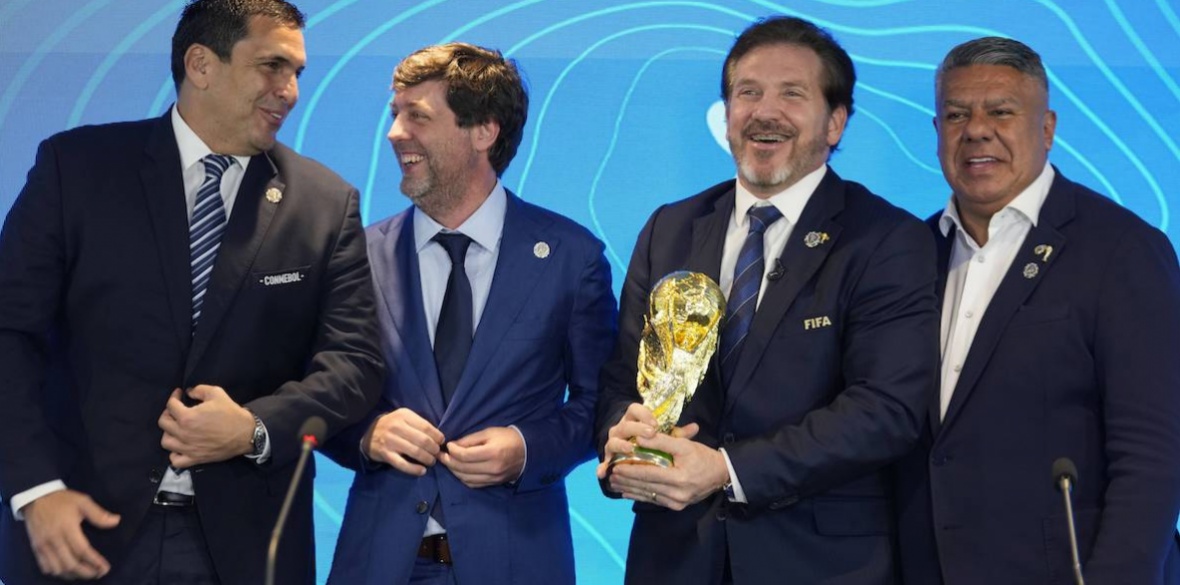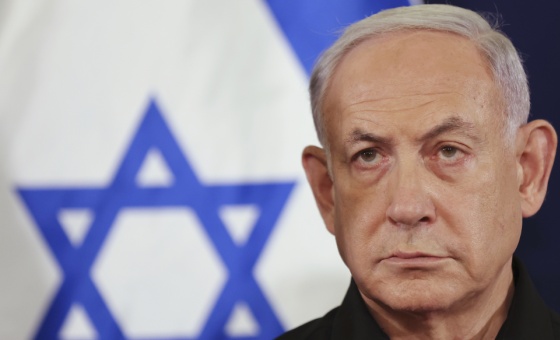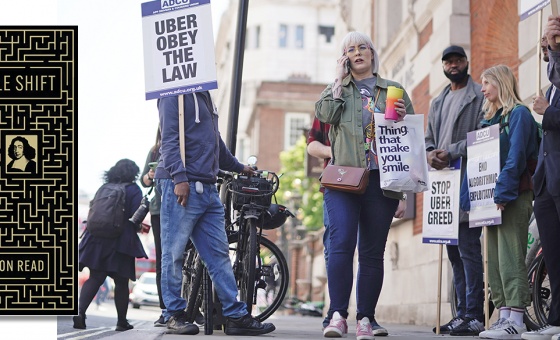This is the last article you can read this month
You can read more article this month
You can read more articles this month
Sorry your limit is up for this month
Reset on:
Please help support the Morning Star by subscribing here
FIFA announced this week that the 2030 World Cup will be hosted at various points in six different countries across three continents.
It is a muddled mess of a tournament that appears geared towards paving the way for Saudi Arabia to host the 2034 edition.
Uruguay, Paraguay, and Argentina will play a part in 2030, marking 100 years since the inaugural World Cup was played in Uruguay in 1930, hence their involvement.
But rather than host the World Cup fully, these three nations will get one home group game each, before the rest of the tournament is played across Spain, Portugal and Morocco. It seems like less of a compromise, and more of a cop-out.
This World Cup across three continents, and the 2026 World Cup being hosted in North America, leaves just two confederations to bid for the 2034 World Cup — Asia and Oceania.
Including this year’s upcoming tournament in Saudi Arabia, six of the last seven Fifa Club World Cups have been hosted in Persian Gulf states.
The one that wasn’t, the 2022 edition hosted in Morocco, was sponsored by the Saudi government’s Ministry of Tourism, under its Visit Saudi programme. Saudi Arabia was more visible at this tournament than Morocco.
The north African country itself would make a good World Cup host and will play a deserved role in the 2030 tournament, but Fifa has become less about developing the game in the regions where it takes it, and more about following the money.
It doesn’t use its riches, earned from organising the world’s most popular and lucrative game, to help parts of the world where football is popular but resources are lacking.
It is more about finding the corners of the globe where it can further add to its coffers, and a Saudi Arabia World Cup in 2034 would be the latest example of that.
This is not to say Saudi Arabian football and its fans do not deserve a World Cup. It is a football-mad country that boasts numerous historic teams and a football heritage.
Saudi Arabian football and its fans shouldn’t be begrudged a tournament, but Fifa’s motives should still be questioned and such a tournament cannot be justified if Fifa continues to support the ruling regime or refuses to be critical of it.
Fifa’s financial results for 2022, published by Fifa itself, revealed that the governing body has reserves of 3.97 billion US dollars, the equivalent of around £3.25 billion.
An organisation with this much money, built up on the back of overseeing a sport that transcends the game itself and permeates the communities and neighbourhoods in which it is played and supported, could do much more to reinvest this money into those areas that need it.
When Fifa does have the chance to make changes, it misses the areas most in need and can even end up affecting them negatively.
If it lands in Saudi Arabia in 2034, it will be more about impressing dignitaries and VIPs, finding the money and trying to impress those sections of society above anything else.
Fifa does invest huge sums of money into certain areas of football and perhaps its most admirable contribution comes in the form of its education programmes such as Fifa Football for Schools.
Initiatives like this show that some areas of this global organisation do have some community, grassroots and humanitarian issues at heart, even if merely in a corporate social responsibility role.
But the governing body generally ignores more difficult topics and, as a result, ignores more pressing areas of need. In these cases, it usually uses the excuse of remaining politically neutral.
Maybe Fifa itself is too big to see the bigger picture. Maybe inside its own bubble, it believes everything is fine, but football tournaments on a global scale have political implications whether it likes it or not.
In creating World Cups and other tournaments, it encounters political and human rights issues such as equality, infrastructure, public services, healthcare and workers’ rights.
The things that are needed to run a World Cup effectively and safely are the things that many countries don’t adequately provide for their own citizens.
To navigate this, Fifa creates a bubble around its tournaments where it inevitably witnesses some of the worst treatment of people and workers on the outskirts of this bubble, but is able to ignore them.
Fifa is almost its own government, landing temporarily in a place before moving on. Workers’ contracts are often temporary and the responsibility of other companies, and any positive legacy is usually temporary, too.
The legacy of previous World Cups leaves a lot to be desired. It generally leaves stadiums too big for any local team to use effectively and the regions it enters go back to how they were before pretty quickly, and in many cases decline.
It is the sports governing body version of the imperial West, landing in a country to get what it needs and then leaving the people to pick up the pieces.
The 2022 Qatar World Cup was Fifa’s most profitable to date, but many of the workers who built the 2022 World Cup environment, so enjoyed by those VIPs and dignitaries, will not have seen anything close to a fair share of these riches.
The overall negative effect on workers isn’t difficult to find. As has been the case to a lesser extent with previous World Cups in Brazil and Russia, the workers creating the whole thing on the ground in Qatar suffered poor working conditions that even led to deaths on site.
Hassan al-Thawadi, secretary-general of the supreme committee for delivery and legacy at the Qatar World Cup, estimated in a TV interview with Piers Morgan that between 400 and 500 migrant workers died while working on projects related to the World Cup.
Investing in football isn’t just investing in the game, it is, or should be, investing in the communities and regions in which it is played, where even the people who have no involvement are affected.
It is a chance to reach everyone, via families or friends who participate in the game.
The degree of separation between someone not involved in the game and someone who is is rarely more than one. As a result, Fifa has the reach and resources to do much more than it currently does.
There are numerous regions in need of better governance, more effective investment and financial aid, but the trend now seems to be to find ready-made solutions.
Going to already rich countries eager to help Fifa organise a high-profile tournament with more enthusiasm and desire than they show to helping their own citizens in normal times.
Fifa is such a broad organisation that it is unfair to tar everyone involved in it with the same brush, but at the top, it appears to have an addictive attraction to wealth and power which means it can lose sight of areas where it could do much more.
Too many of its big decisions, such as where to host World Cups, appear driven by where the money is rather than where it is needed.











